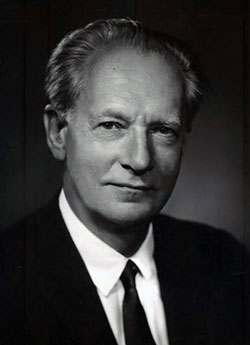Why was Carl Ferdinand Cori Awarded the Nobel Prize for Physiology or Medicine in 1947?
Carl Ferdinand Cori: Nobel Prize Laureate for Deciphering Glycogen Metabolism
In 1947, the Nobel Prize for Physiology or Medicine was awarded to Carl Ferdinand Cori, a prominent biochemist, along with his wife Gerty Cori and Argentine physiologist Bernardo Houssay. The prestigious recognition was granted in acknowledgment of the Coris’ groundbreaking research on carbohydrate metabolism, particularly their work on the enzymatic processes involved in glycogen metabolism. This article delves into Carl Ferdinand Cori’s remarkable achievements and the reasons why he was honored with the Nobel Prize.

Glycogen Metabolism and the Cori Cycle:
Carl Cori’s significant contributions primarily revolved around the investigation of glycogen, a complex carbohydrate that serves as a crucial energy reserve in animals and humans. He and his wife Gerty Cori conducted groundbreaking research in the 1920s and 1930s, where they elucidated the metabolic pathway now known as the Cori Cycle.
The Cori Cycle describes how muscles convert glycogen into glucose during periods of high demand for energy, such as during intense exercise. The glucose is then utilized to fuel muscular activity. Subsequently, in the liver, the excess glucose is reconverted into glycogen for storage. The Cori Cycle not only demonstrated the intricate regulation of glycogen metabolism but also provided insights into the body’s ability to maintain energy balance during varying physiological states.
The Discovery of Phosphorylase Enzyme:
A significant milestone in Carl Cori’s research was the discovery of the enzyme phosphorylase, which plays a pivotal role in glycogen metabolism. In 1937, the Coris identified and isolated the phosphorylase enzyme responsible for breaking down glycogen into glucose units in muscle tissue. This finding was groundbreaking, as it revealed the enzymatic basis behind the Cori Cycle and provided a profound understanding of how the body accesses energy reserves during exertion.
Phosphorylase Deficiency and Glycogen Storage Diseases:
Carl Cori’s work on glycogen metabolism extended beyond basic biochemistry and had practical implications in medicine. The Coris’ research led to the discovery of several genetic disorders known as glycogen storage diseases. These diseases are characterized by deficiencies in specific enzymes involved in glycogen metabolism, leading to abnormal glycogen accumulation in various tissues.
Their findings on the enzymatic basis of glycogen storage diseases not only contributed to the understanding of these rare disorders but also laid the groundwork for further research on genetic metabolic diseases, advancing the field of medical genetics.
Legacy and Recognition:
Carl Ferdinand Cori’s groundbreaking work on glycogen metabolism and the Cori Cycle revolutionized the understanding of carbohydrate metabolism in the human body. Their discoveries not only advanced the field of biochemistry but also had profound implications for medicine, particularly in the study of metabolic disorders.
In recognition of their exceptional contributions, Carl Ferdinand Cori, Gerty Cori, and Bernardo Houssay were jointly awarded the Nobel Prize for Physiology or Medicine in 1947. The Nobel Committee highlighted the Coris’ “discovery of the course of the catalytic conversion of glycogen” as a pioneering achievement that significantly contributed to the understanding of cellular energy processes and metabolic regulation.
Carl Ferdinand Cori’s Nobel Prize in Physiology or Medicine in 1947 was a well-deserved recognition of his exceptional contributions to the field of biochemistry and glycogen metabolism. His discoveries, along with his wife Gerty Cori, not only unveiled the intricate enzymatic processes involved in glycogen metabolism but also provided key insights into the regulation of energy balance in the human body.
The Coris’ research legacy lives on, inspiring generations of scientists to explore the complexities of metabolic pathways and contributing to the advancement of medical knowledge, particularly in the diagnosis and treatment of metabolic disorders. Carl Ferdinand Cori’s lasting impact on science and medicine continues to be celebrated and remains an inspiration for future generations of researchers in the pursuit of scientific excellence.




